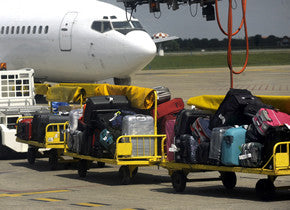
Musicians traveling by air with musical instruments face unprecedented uncertainties in our difficult times.
Some have even had to choose at the last minute between stowing precious instruments in the cargo hold or being refused boarding.
Musicians do not have the specific right to carry musical instruments aboard aircraft. The ancient historical privileges accorded to captains of vessels make it extremely unlikely this will change, and the best we can expect is clearer rules that provide the most people with the greatest benefit.
The Department of Transportation, Transportation Security Administration, and the Federal Aviation Administration (FAA) are continually revising their rules regarding musical instruments and aircraft. A safe assumption is that rules may have changed since your last flight and you ought to check with your airline.
Airlines and Reservations
Each airline has unique restrictions regarding carry-on items. Reserve a ticket online then call the airline reservations desk for help. Call during business hours to reach the most experienced personnel and inform the reservation agent you are carrying a valuable musical instrument.
If you have flown the same airline before you may be able to cite precedent to have some influence with personnel.
Before the Flight
Clean out the case; place any tools, liquids etc. in checked baggage to simplify the screening process. Limit the number of carry-on items. In addition to your instrument, consider carrying only one, small item. Arrive early. Check-in and screening usually takes longer than you remember and getting to the gate early gives you time to deal with any last-minute problems.
Checking your Instrument
If you plan to check your instrument, do whatever possible to keep your instrument off the carousel. If it gets stuck while the belt keeps moving it will take a terrible pounding. Ask to have the instrument taken by hand from the check in to the baggage area. Stay with the instrument until it is taken away. During the flight, politely ask flight staff to call down and request the same treatment at the other end.
See if your insurance will cover hold damage. Airlines generally limit their supplemental coverage and the tag they apply may announce to the world the value of your instrument.
A standard case absolutely will not adequately protect an instrument checked into the hold. An extra padded case that fits over your case may work, but do not guarantee safety.
If you fly a lot you might want to invest in a custom “ATA-style” flight case. While they are not cheap after the first hassle free flight you will love it. If you are interested please contact us as there are new models coming into the market all the time. One drawback- you do not have your regular case. A solution is to have an off-the-rack ATA case fitted with extra foam to hold a regular instrument case.
For cellos I have used the David Gage Cello case.
You may want to present yourself to the TSA office so they can search and OK your instrument going into the hold. At some airports they are very friendly and will let you re-pack it.
Last-Minute Problems
Always remember safety and security are the most important responsibilities of airport and transportation officials, gate and flight attendants, and the aircraft captain. Don’t take it personally if staffers seem indifferent to your concerns. Airline crews have to seat passengers very quickly and need to deal quickly with unexpected or unusual situations. You are probably not the only passengers with special needs.
If confronted by a flight attendant who wants to move your instrument to the hold, calmly explain the preparations you have made to prepare your instrument to safely travel in-cabin.
If necessary, immediately ask to deplane so that you can resolve this matter with airline supervisors. You will have fifteen minutes at most to resolve this issue before the plane backs away from the gate.
Always act like a polite grown-up: you catch more flies with honey than vinegar.
Prepare for the possibility that your instrument may not be allowed in-cabin, despite your preparations. Are you willing to send your instrument by air courier? Will it withstand transportation in the cargo hold? Is travel by train or car a possibility?
Additional Resources
Passports are now required for all travel outside the United States. For full information visit http://travel.state.gov
You must fully understand if your insurance coverage is up-to-date and adequate. When traveling abroad, check your coverage is world- wide. Several excellent companies:
Clarion Associates
Heritage Insurance Services
Lark Insurance
The Transportation Security Administration has a useful page about air travel.
While airline regulations vary by country, your own airline should be able to inform you if what was acceptable outbound will also be acceptable on your return trip. But remember to verify you arrangements if you have a complicated itinerary and are returning from a different country on a different airline.
In Conclusion
Please remember that these recommendations stem from our long experience but are not all inclusive. We hope you do not experience the sorrow of damage to your instrument. An ounce of prevention is better than a year of restoration.
And now, a word from our attorney: Under no circumstances whatsoever shall Charles J. Rufino Violin Maker LLC or any d/b/a/ or subsidiary be liable for any indirect, consequential, or punitive damages arising from following the advice or suggestions contained in this document. In the event of any damage to any person or entity due to reliance on the advice or information in this document, the maximum liability to Charles J. Rufino Violin Maker LLC or any subsidiary to the shall not exceed the consideration paid for this information.



Leave a comment